ADVANCE PRAISE FOR A DIGITAL BUNDLE
Wemigwans concept of the digital bundle is an integral and effective intellectual intervention, [one that] I can see as the cornerstone of a much greater theoretical work about the epistemic facets of digitized Indigenous Knowledge.... The more documentation that we have of digital bundles, the more that policy-makers, librarians, archivists, museum specialists, and technologists can prepare spaces for these kinds of projects.... Therefore, this is an important book not only to an Indigenous studies audience, but also within the field of library and information science, archival and museum studies, Internet studies, cultural studies, and society and technology studies. Marisa Duarte, author of Network Sovereignty: Building the Internet across Indian Country
Jennifer Wemigwans work is timely and will spark a dialogue about the cultural shift in how we share Indigenous Knowledge online. The movement promises reconciliatory and resurgent possibilities for global Indigenous collaboration and organization, so long as we ground the movement in Indigenous cultural perspectives, ethics, and care. Jean-Paul Restoule , co-editor of Indigenous Research: Theories, Practices, and Relationships
A Digital Bundle highlights the Internet and its role in the transmission of Indigenous Knowledge from Elders and established Indigenous academics.... Jennifer Wemigwans has clearly emerged as an exemplary model of a new generation of Indigenous scholar who is ethically responsible and equally knowledgeable about the generational transference of knowledge in Indigenous communities. This work is not only about the interstices of Indigenous Knowledge and technology but, based on Wemigwans example, a new standard for practicing it. Jolene Rickard , director of the American Indian and Indigenous Studies Program, Cornell University

Protecting and
Promoting
Indigenous
Knowledge Online
Jennifer Wemigwans

For those of us who are actively searching for our ways of knowing.
2018 Jennifer Wemigwans
All rights reserved. No part of this work covered by the copyrights hereon may be reproduced or used in any form or by any meansgraphic, electronic, or mechanicalwithout the prior written permission of the publisher. Any request for photocopying, recording, taping or placement in information storage and retrieval systems of any sort shall be directed in writing to Access Copyright.
Excerpts taken from L.T. Smith's Decolonizing Methodologies reprinted with permission.
Printed and bound in Canada at Marquis. The text of this book is printed on 100% post-consumer recycled paper with earth-friendly vegetable-based inks.
Cover art: Courtesy the author
Cover and text design: Duncan Campbell, University of Regina Press
Copy editor: Dallas Harrison
Proofreader: Rhonda Kronyk
Indexer: Sergey Lobchev, Brookfield Indexing Services
Library and Archives Canada Cataloguing in Publication
Wemigwans, Jennifer, author
A digital bundle : protecting and promoting Indigenous knowledge online / Jennifer Wemigwans. Includes bibliographical references and index.
Issued in print and electronic formats. ISBN 978-0-88977-551-0 (softcover).ISBN 978-0-88977-552-7 (PDF).ISBN 978-0-88977-553-4 (HTML)
1. Internet and native peoples--Canada. 2. Internet and indigenous peoples. 3. Computer network resources. 4. EthnoscienceComputer network resources. 5. Native peoplesCanadaComputer network resources. 6. Indigenous peoples Computer network resources. 7. Native peoplesCanadaCommunication. 8. Indigenous peoplesCommunication. I. Title.
E98.C73W46 2018 302.23108997071 C2018-903901-9 C2018-903902-7
9 8 7 6 5 4 3 2 1
 University of Regina Press, University of Regina Regina, Saskatchewan, Canada, s4s 0a2 tel: (306) 585-4758 fax: (306) 585-4699 web : www.uofrpress.ca
University of Regina Press, University of Regina Regina, Saskatchewan, Canada, s4s 0a2 tel: (306) 585-4758 fax: (306) 585-4699 web : www.uofrpress.ca
We acknowledge the support of the Canada Council for the Arts for our publishing program. We acknowledge the financial support of the Government of Canada. / Nous reconnaissons lappui financier du gouvernement du Canada. This publication was made possible with support from Creative Saskatchewans Creative Industries Production Grant Program and with the help of a grant from the Federation for the Humanities and Social Sciences, through the Awards to Scholarly Publications Program, using funds provided by the Social Sciences and Humanities Research Council of Canada.



Contents
Acknowledgements
This book comes from sharing many cups of tea with family, friends and community. Chi miigwetch to my partner Doug Anderson and my son Nigel, and to my colleagues and friends Dr. Kari Delhi, Dr. Jean-Paul Restoule, Dr. Rinaldo Walcott, Dr. Sandy Grande, Prof. Myriam Rafla, Tracy Pryce, and Dr. Susan Dion. I also want to deeply thank all the research participants who shared their insights on this project: Dr. John Borrows, Donna Bourque, Prof. Larry Chartrand, Brenda Dubois, Dr. Rainey Gaywish, Cheryl LHirondelle, Priscilla Lepine, Monique Mojica, milie Monnet, Dr. Angela Nardozi, and Janetta Soup.
I also want to acknowledge all the people who made FourDirections-Teachings.com a reality, including Winston Bromley, a friend and ally committed to respectful representations of Indigenous Knowledge and ways of being, and to the Elders who shared their teachings: Stephen Augustine, Dr. Reg Crowshoe and Geoff Crow Eagle, Mary Lee, the late Lillian Pitawanakwat, and Tom Porter.
Thanks to the University of Regina Press, in particular Karen Clark, whose generosity of spirit and time was greatly appreciated, and to editors Kelly Laycock and Dallas Harrison, whose attention to detail pulled all the pieces together. Also a huge thanks to the anonymous reviewers, whose guidance and questions made this work better.
Chapter 1
Indigenous Resurgence and the Internet
Indigenous ontologies and cosmologies are regenerating communities across Turtle Island and reconnecting Indigenous Peoples with their spiritual and cultural power. This book looks at how Indigenous Knowledge online has had socio-cultural effects and how information communication technology ( Ict ) affects relationships among diverse Indigenous Peoples and the flow of power between Indigenous Peoples and the state. Within an Indigenous framework, this work supports the notion that power residing in media networks is stronger than that residing in government (Castells, 2010). A series of interviews with Indigenous activists, artists, educators, and front-line workers demonstrates a vast network of cultural exchange based upon the flow of local Indigenous Knowledge from specific community contexts to the national stage and even the global stage. Indigenous Knowledge online is instrumental to the success of Indigenous community resurgence and radical application of knowledge in all fields, including education, health, law, and social well-being. The interviews conducted across Canada reveal not only the dialectical relationship between online and offline political action and engagement but also how activists, educators, and front-line workers use Indigenous Knowledge online to create, develop, and enhance their own work. Indigenous Knowledge online speaks back to dominant colonial systems of knowledge in Canada by representing an active presence rooted in the local soils of diverse Elders and Knowledge Keepers.
Next page

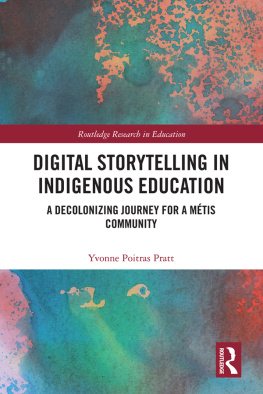
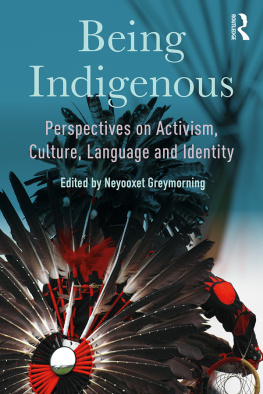
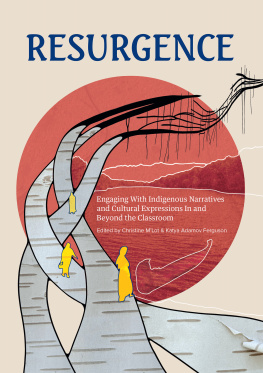
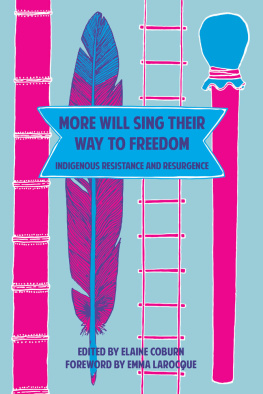
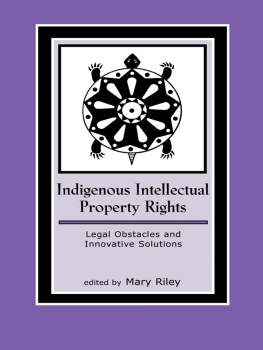
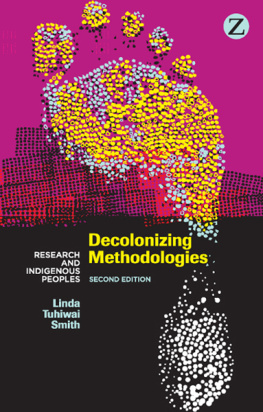
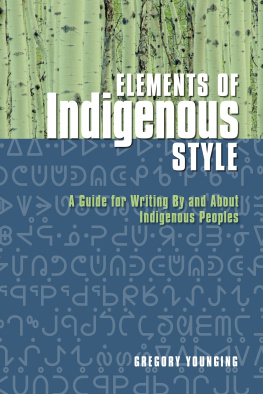


 University of Regina Press, University of Regina Regina, Saskatchewan, Canada, s4s 0a2 tel: (306) 585-4758 fax: (306) 585-4699 web : www.uofrpress.ca
University of Regina Press, University of Regina Regina, Saskatchewan, Canada, s4s 0a2 tel: (306) 585-4758 fax: (306) 585-4699 web : www.uofrpress.ca

